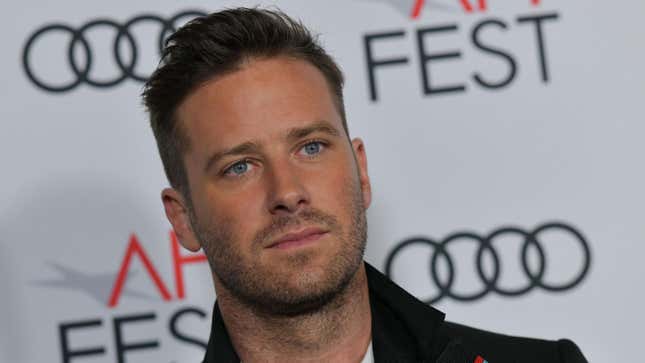Woman Who Accused Armie Hammer of Rape Says New Docuseries Exploits Her Trauma: ‘They Remind Me of Armie’
The woman, who goes by Effie, has accused Hammer of "violently" raping her for four hours. The LAPD has been investigating the allegation since March 2021.
Entertainment

While several women have accused Armie Hammer of emotional abuse, coercion, etc., only one woman—who goes by the name “Effie,” but conceals her last name—has accused Hammer of rape. Effie’s allegation that Hammer “violently raped” her for four hours in April 2017, first made public in March 2021, prompted an ongoing investigation by the Los Angeles Police Department. Now, following the Friday release of House of Hammer—a new Discovery+ docuseries about the allegations against Hammer and other men in his family—Effie has accused the three-part series of re-victimizing her for profit.
“The way they’ve been exploiting my trauma is disgusting,” Effie said in a statement to the Los Angeles Times on Friday. “When I keep screaming ‘no’ and they keep going, saying they don’t need my permission, they remind me of Armie.”
Effie told the Times that a month after she went public with her allegation against Hammer, a producer for House of Hammer contacted her to ask her to be interviewed for the docuseries. She told the newspaper that she declined, telling the producer: “It is extremely inappropriate of you to exploit such a tragic, vulnerable time in many people’s lives, with no regard whatsoever for our healing process and privacy.” Despite Effie’s refusal to participate, the docuseries has included screenshots and posts Effie shared to her Instagram account, as well as clips from her 2021 press conference in which she recounted the rape through tears.
In an interview with the Times, filmmakers Elli Hakami and Julian Hobbs, who made House of Hammer, acknowledged Effie’s perspective, but defended their choice to include her story in the docuseries. “She has a right to do what she wants to do. The people who are participants in the film are very proud of the work that they’ve done in it. They’re doing press for it. For them, it was a good experience,” Hobbs told the newspaper. “[Effie]‘s been vocal that she thinks that making any form of media out of these events is somewhat problematic. As filmmakers, we don’t take that view. We feel we actually have an obligation to tell the stories.”
-

-

-

-

-

-

-

-

-

-

-

-

-

-

-

-

-

-

-

-

-

-

-

-

-

-

-

-

-

-

-

-

-

-

-

-

-

-

-

-








































